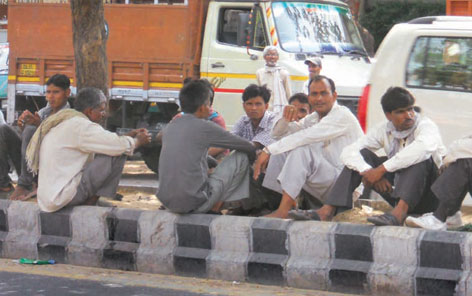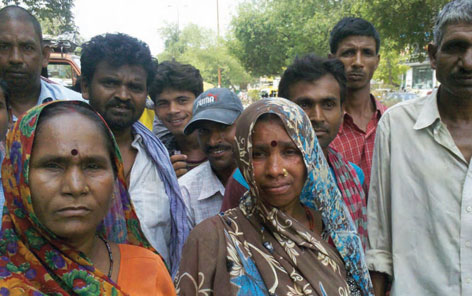

INVISIBLE HANDS
Rajendar , a labour migrant, squats on a dusty footpath near Tara Apartments in South Delhi. He has a paint brush in one hand and a cotton bag in the other. He waits with a droopy expression for an employer.
People walk by him oblivious to the journey he has taken from Bhagalpur to Delhi. He sees us looking at him and with a sparkle of hope in his eyes he walks up to us and asks 'Labour chaiye kya?' . This is one of the several labour chowks in Delhi and the labourers sit waiting for their employers, some barehanded and some with their equipment. They wait till afternoon, sometimes till evening. In a day they may earn upto Rs.500 which may otherwise be as low as Rs.150 or nothing at all. Such labour chowks are abundant in Delhi yet inhabit the periphery of the urban vision.
There we met four men who told us stories about their village and our city.
INVISIBLE HANDS work as a medical representative. The terms of employment stated that for the first three months he wouldn't be paid any salary. Thereafter, he will be paid Rs.4,000 every month and three-fourth of his earnings would go to the company.
 After 10 months, he will start
getting paid Rs.14,000 per month
and may also get all the other
promised amenities. Sonu had no
means to survive till then and could
not take a chance with the offer. He
lost his security deposit. Sonu also
said, "There were 20 other people
for the interview. They had all come
in a similar manner and were
similarly exasperated". Pankaj is
another young man who had come
to Delhi and faced similar
exploitation. He went to the
Kapashera Border near Gurgaon
and was asked to pay Rs.850 which
he had to borrow. He doesn't go
back home anymore as he had
borrowed further to survive in the
city and cannot afford the luxury of
missing work.
After 10 months, he will start
getting paid Rs.14,000 per month
and may also get all the other
promised amenities. Sonu had no
means to survive till then and could
not take a chance with the offer. He
lost his security deposit. Sonu also
said, "There were 20 other people
for the interview. They had all come
in a similar manner and were
similarly exasperated". Pankaj is
another young man who had come
to Delhi and faced similar
exploitation. He went to the
Kapashera Border near Gurgaon
and was asked to pay Rs.850 which
he had to borrow. He doesn't go
back home anymore as he had
borrowed further to survive in the
city and cannot afford the luxury of
missing work.
We met Sunil on the banks of the Yamuna near Kashmere Gate, ISBT. He lives with nearly five thousand others like him in this area extending to Majnu ka Tila. Sunil came to Delhi from Bengal following a land dispute with his brother. He has received primary education and can drive. He is recovering from an accident and has been in one of the shelters in this area for the last five months. He too came to Delhi looking for a job, stayed on, got disheartened and today is an abandoned, homeless human being with no relations with anyone from his village.
The public spaces in Delhi abound with these kind of advertisements and while contacted on the guise of a migrant one such advertiser responded and introduced himself as Hakim. He advised us to go to an office in the Badarpur area with Rs.1050. He told us that the work involved sorting, packing and transporting medicines for a pharmaceutical company which goes by the name of G.M. Ltd. Interestingly, he also warned us of possible pitfalls in these kind of job offers.
Harsh Mander, an exbureaucrat and prominent labour activist, said close to 200 labour laws have been introduced in the country. But few, if any, pertain to the protection of migrant labour.

"Labour reforms anywhere in the world have always meant lesser and lesser protection for labour",he said. People come to this city seeking a better life, some survive, some struggle and some lose. The migrant population and the exploitation that they face in this city has assumed alarming invisibility. The public spaces in Delhi thrive on the invisible walls of affluence and privileges. Our cities have stopped taking notice of the migrant population that waits for employers in the discreet bylanes of this city or on the road dividers of the south extension market. The advertisements that place the lucrative bets for these labourers still abound the walls of Delhi. Neither our aesthetics nor our regulatory mechanisms seem to be noticing.
 |
| Although women are a rare sight in a labour chowk, Sumati, from Jhansi (left) and her friend wait for a day's work at the Okhla labour chowk in New Delhi. They typically get cleaning chores and earn Rs 200 to Rs 300 each day |
Rajendar , a labour migrant, squats on a dusty footpath near Tara Apartments in South Delhi. He has a paint brush in one hand and a cotton bag in the other. He waits with a droopy expression for an employer.
People walk by him oblivious to the journey he has taken from Bhagalpur to Delhi. He sees us looking at him and with a sparkle of hope in his eyes he walks up to us and asks 'Labour chaiye kya?' . This is one of the several labour chowks in Delhi and the labourers sit waiting for their employers, some barehanded and some with their equipment. They wait till afternoon, sometimes till evening. In a day they may earn upto Rs.500 which may otherwise be as low as Rs.150 or nothing at all. Such labour chowks are abundant in Delhi yet inhabit the periphery of the urban vision.
There we met four men who told us stories about their village and our city.
INVISIBLE HANDS work as a medical representative. The terms of employment stated that for the first three months he wouldn't be paid any salary. Thereafter, he will be paid Rs.4,000 every month and three-fourth of his earnings would go to the company.
 After 10 months, he will start
getting paid Rs.14,000 per month
and may also get all the other
promised amenities. Sonu had no
means to survive till then and could
not take a chance with the offer. He
lost his security deposit. Sonu also
said, "There were 20 other people
for the interview. They had all come
in a similar manner and were
similarly exasperated". Pankaj is
another young man who had come
to Delhi and faced similar
exploitation. He went to the
Kapashera Border near Gurgaon
and was asked to pay Rs.850 which
he had to borrow. He doesn't go
back home anymore as he had
borrowed further to survive in the
city and cannot afford the luxury of
missing work.
After 10 months, he will start
getting paid Rs.14,000 per month
and may also get all the other
promised amenities. Sonu had no
means to survive till then and could
not take a chance with the offer. He
lost his security deposit. Sonu also
said, "There were 20 other people
for the interview. They had all come
in a similar manner and were
similarly exasperated". Pankaj is
another young man who had come
to Delhi and faced similar
exploitation. He went to the
Kapashera Border near Gurgaon
and was asked to pay Rs.850 which
he had to borrow. He doesn't go
back home anymore as he had
borrowed further to survive in the
city and cannot afford the luxury of
missing work.We met Sunil on the banks of the Yamuna near Kashmere Gate, ISBT. He lives with nearly five thousand others like him in this area extending to Majnu ka Tila. Sunil came to Delhi from Bengal following a land dispute with his brother. He has received primary education and can drive. He is recovering from an accident and has been in one of the shelters in this area for the last five months. He too came to Delhi looking for a job, stayed on, got disheartened and today is an abandoned, homeless human being with no relations with anyone from his village.
The public spaces in Delhi abound with these kind of advertisements and while contacted on the guise of a migrant one such advertiser responded and introduced himself as Hakim. He advised us to go to an office in the Badarpur area with Rs.1050. He told us that the work involved sorting, packing and transporting medicines for a pharmaceutical company which goes by the name of G.M. Ltd. Interestingly, he also warned us of possible pitfalls in these kind of job offers.
Harsh Mander, an exbureaucrat and prominent labour activist, said close to 200 labour laws have been introduced in the country. But few, if any, pertain to the protection of migrant labour.

"Labour reforms anywhere in the world have always meant lesser and lesser protection for labour",he said. People come to this city seeking a better life, some survive, some struggle and some lose. The migrant population and the exploitation that they face in this city has assumed alarming invisibility. The public spaces in Delhi thrive on the invisible walls of affluence and privileges. Our cities have stopped taking notice of the migrant population that waits for employers in the discreet bylanes of this city or on the road dividers of the south extension market. The advertisements that place the lucrative bets for these labourers still abound the walls of Delhi. Neither our aesthetics nor our regulatory mechanisms seem to be noticing.

